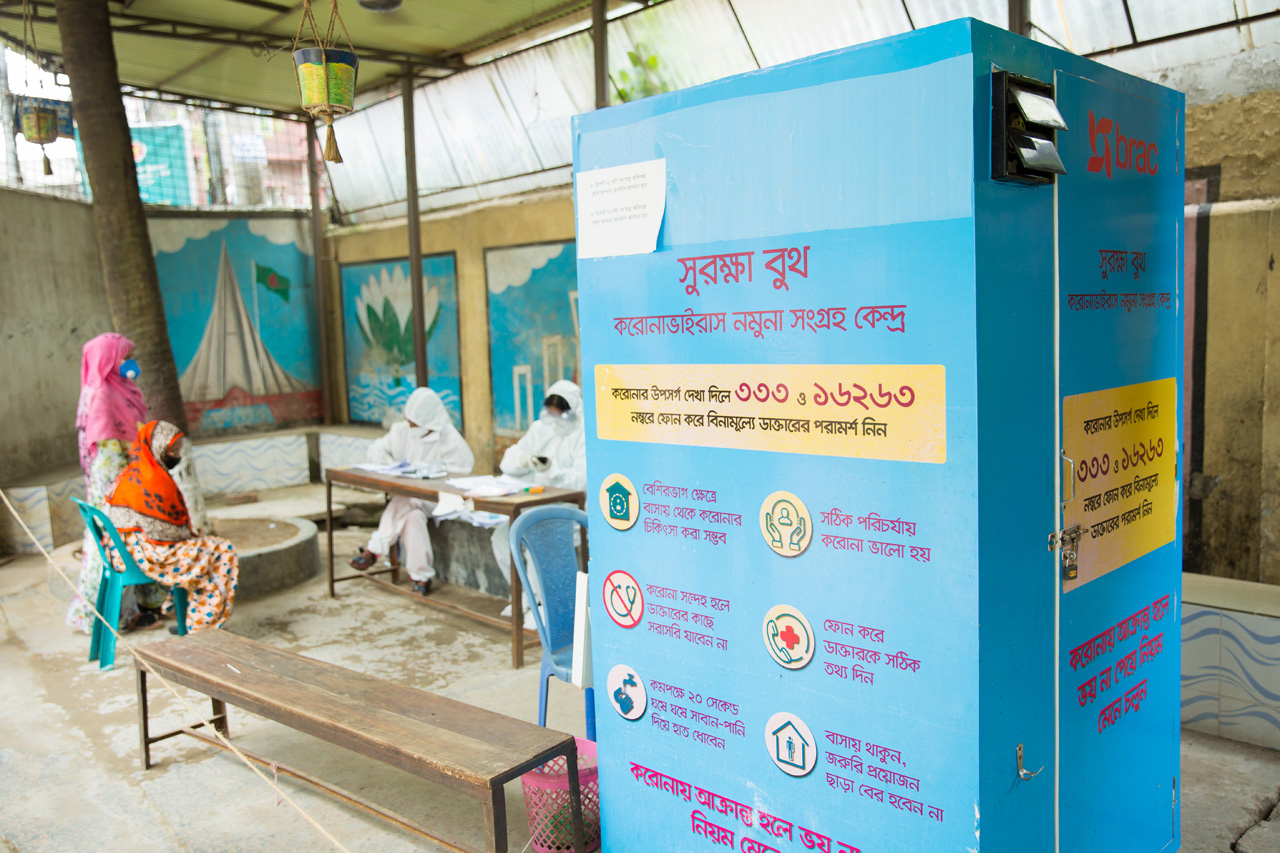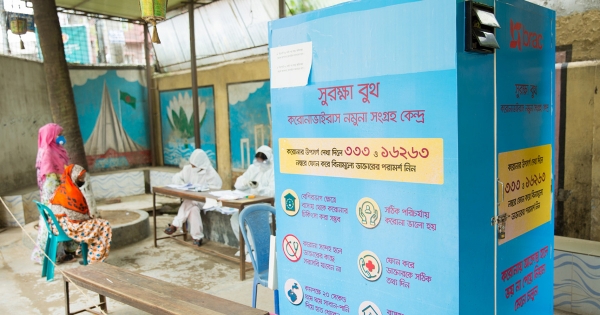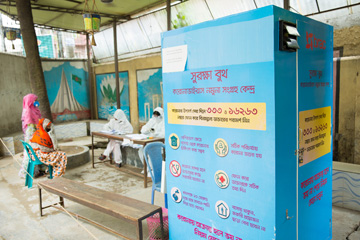
The activity will kick off primarily with 16 booths in Dhaka, Chittagong
BRAC will launch antigen-based COVID-19 rapid testing for suspected patients to get results within a comparatively shorter time period. The activity will be run under the overall supervision of the Directorate General of Health Services (DGHS). The service will initiate from tomorrow, Saturday primarily with 16 booths- 15 in Dhaka and one in Chattogram.
BRAC since March 2020 has been collecting samples to detect Coronavirus through RT-PCR test by installing testing booths (kiosks) in different parts of the country. It is now adding the Rapid Antigen Test to the existing facilities.
The plan to expand this activity has come amid the new surge in COVID-19 cases. The Rapid Antigen Test facility will gradually expand to BRAC’s 32 testing booths in Dhaka and 4 testing booths in Chattogram, according to the Health, Nutrition and Population Programme (HNPP) of BRAC.
The booths are open from 9am to 12 noon from Saturday to Thursday. Each of the booths will be able to collect and analyse 150 samples a day.
Currently, RT-PCR tests are followed in Bangladesh for the majority of the samples, which takes at least 24 hours or more to get the results. But, an antigen test will deliver the result within 30 minutes only, which, BRAC expects, will add pace to the government’s COVID-19 testing operations.
As part of its effort to support DGHS, BRAC is operating 41 walk-in sample collection booths in areas vulnerable to Novel Coronavirus across the country. These samples are transferred to government approved laboratories that deliver results after testing them in the RT-PCR process. Five of these booths are designated only to collect samples from the passengers going abroad.
Director of BRAC Health, Nutrition and Population Programme Morseda Chowdhury said, “Bangladesh’s health system got some time to prepare itself to deal with the first wave of COVID-19, but the second wave appeared too fast. To tackle the situation, there is no alternative to maintain health advisories, along with testing suspects and referring them for isolation. I hope taking the Rapid Antigen Test to the doors of the people will play an important role in this regard, as it will help speedy diagnosis and management of the patients.”
She further said, “The benefits of this initiative must be taken to all the regions vulnerable to COVID-19 for which assistance from all quarters is essential. At present, donor organisation The Foreign, Commonwealth & Development Office (FCDO) of the Government of UK is supporting BRAC and DGHS in this effort.”
Who and how to get the service
Anyone who has been referred by a registered physician, is experiencing COVID-19 symptoms like fever, dry cough, fatigue, sore throat and respiratory difficulties, or has been in contact with a confirmed COVID-19 patient, is eligible to undergo the test through BRAC operated booths.
A person must take an appointment online to get the service. The BRAC staff employed at the booths will assess the symptoms and case history of the suspect to decide whether it will be an antigen test or an RT-PCR test. If the result of a sample analysed via antigen testing detects the presence of the novel coronavirus, the service seeker will be notified within 30 minutes. Results of a positive patient tested via antigen testing will be uploaded in the website within three or four hours.
However, if a person’s antigen test results come back negative despite having symptoms, the sample will be retested using the RT-PCR procedure (sample from the patient, however will be taken once).
To get the test via BRAC booth, a person must take an online appointment at coronatest.brac.net. They must pay the government fixed Tk100 as fee via mobile money service Nagad App to get the service.
The total process of sample submission is designed in a 7-step process.
How to apply online
A service seeker must log on to coronatest.brac.net and select “COVID identification for tomorrow” tab. The answer must be “yes” to any of the three questions asked in the tab. He/she will have to select the district or city and find out the nearest booth of his/her location.
In the third step, he must click in “I agree and want a COVID-19 test” option. Clicking on the button will create an application form.
The form must be filled with necessary information, including a mobile contact number or e-mail address. Once the information is submitted, a verification code will be sent to the registered mobile number. This is why information of a correct mobile number is essential. Once the person enters the code in the website, it will confirm the application.
To complete the application, he/she has to enter the Nagad app and click on the tab “Bill Pay” where there will be an option saying fee for COVID-19 sample collection. Then select "MOHFW COVID-19 Test Booth" and pay Tk100.
Successful payment will generate a transaction code. People paying the fee from Nagad App will get a code from the app, while people paying the money from the website will get it through Short Messaging Services (SMS).
In the last stage, the person must enter a transaction number in the website to complete the application. Confirmation of the application will be sent via an SMS.
Once the sample is collected, it will be sent to the laboratories designated by DGHS. The results of the test will be sent to the recipients via SMS. BRAC does not collect any money from the test fees, which goes to the government exchequer for public welfare.
Time for report delivery
If the result of a sample analysed via antigen testing detects the presence of the novel coronavirus, the service seeker will be notified within 30 minutes and results of a positive patient will be uploaded in the website within three or four hours.
But samples collected via BRAC booths for RT-PCR tests are transferred to DGHS authorised laboratories. It is on DGHS to inform the service seeker about reports depending on the capacity of the laboratories. BRAC does not hold the jurisdiction over the time taken to test the samples and generate reports from the laboratories.
Location of BRAC Booths
BRAC will collect samples for antigen testing at 10 booths under Dhaka North City Corporation, nine booths under Dhaka South City Corporation and one booth under Chattogram City Corporation.
Among them, facilities under DNCC are available at Govt Unani and Ayurvedic Medical College Hospital in Mirpur 13, Uttara Adhunik Medical College in Sector-9 of Uttara, Uttara High School at Sector-6 of Uttara, Asaduzzaman Khan Kamal Community Center at Modhubagh of Moghbazar, Ward 10 community centre near Buddhijibi Graveyard in Mirpur-1, Chaderhat Eidgah Playground at Babor Road of Mohammadpur, Dhaka Dental College and Hospital at Mirpur 14, National Institute of Kidney Diseases & Urology in Agargaon of Sher-e-Bangla Nagar, Abdul Halim Community Center at Tejturi Bazar at Farmgate, and York Hospital (House-12, Road-22) in Banani.
Antigen services under DSCC will be available at Paltan Community Center in Naya Paltan, Bashabo Community Center, Wari Girls Government Primary School, Dhaka National Medical College in Johnson Road of Old Dhaka, and Maternal and Child Health Training Institute in Azimpur.
Office of the ward councilor in Bibirhat at Panchlaish under Chattogram City Corporation will also offer the service.
Responding to the government’s call in COVID-19 prevention activities, BRAC’s walk-in sample collection booths (kiosk) have been collecting samples of the suspected patients since March 11 last year, among which 41 are currently in operation.










